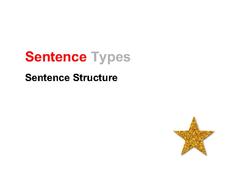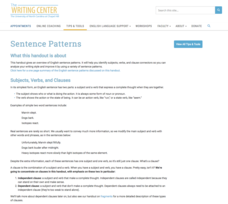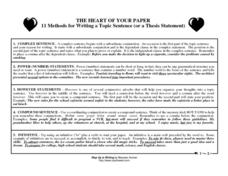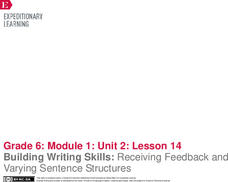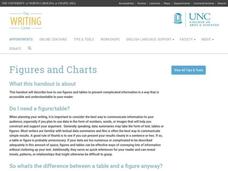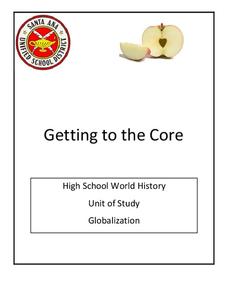Curated OER
Simple, Compound, and Complex Sentences
Guide young grammarians through common sentence structures with a helpful slideshow presentation. Focusing on coordinating and subordinating conjunctions, the presentation helps individuals to see the elements that make up...
University of North Carolina
Sentence Patterns
In an ideal world, sentences in a college-level essay should feature a variety of sentence types. In reality, most papers stick to simple and compound sentences, two of the types a handout on sentence patterns discusses. Part of a larger...
Curated OER
The Heart of Your Paper: 11 Methods for Writing a Topic Sentence (or a Thesis Statement)
Help your young writers produce high-quality topic and thesis statements that go beyond basic wording and really illustrate complex ideas and critical thinking skills. From however and compound sentence statements to using...
Curated OER
Sentence Structure: Sentence Types
Sixth graders identify parts that make up different types of sentences with a grammar presentation. The last few slides prompt learners to complete 10 exercises in which they indicate whether each sentence is simple, compound,...
Trinity University
Explain Yourself: An Expository Writing Unit for High School
Introduce expository writing with a unit that asks writers to craft an essay to explain a belief, value, or priority that is important to them. Mini-lessons within the unit focus on crafting thesis statements and conclusions, selecting...
Teach It Primary
The Pied Piper of Hamelin
Six tasks make up a lesson plan designed to reinforce comprehension and language skills using the poem "The Pied Piper" by Robert Browing. Scholars discuss and define unknown words, identify adjectives and onomatopoeia, review...
EngageNY
Grade 10 ELA Module 3: Unit 3, Lesson 9
Let's join together and make a sentence. Scholars take the next step in revising their argumentative essays by combining independent clauses to make complex sentences. Writers use a Colon and Semicolon Handout to practice different ways...
Texas Education Agency (TEA)
Syntax (English II Reading)
Lesson five in the series focuses on syntax and the elements that make sentences enjoyable. Learners practice building different clauses and phrases and using figures of speech and rhetorical and literary devices.
University of North Carolina
Conciseness
Twitter has helped people learn to express their ideas in as few words as possible, but away from the 280-character limit, writers still struggle with keeping their writing short and to the point. Conciseness is the focus of a writing...
EngageNY
Building Writing Skills: Receiving Feedback and Varying Sentence Structures
Everyone is good at something. Scholars receive their mid-unit assessments with feedback. They look over their papers and write their strengths as a writer and goals on index cards. The class then has a mini lesson in using sentence...
Pearson
Conditionals
Are you wishing for a great grammar presentation? Wish no longer with an engaging slideshow that focuses on the conditional verb form. Learners begin their sentences with wish before completing them with the correct usage.
University of North Carolina
Summary: Using it Wisely
Sometimes summarizing keeps a writer from going deeper into their analysis—don't fall into that trap. Learn the difference between summarizing and analyzing using an insightful resource. Focusing on introductions, the lesson shares...
University of Kansas
Feelings - Thematic Unit
Boost language skills with a unit all about feelings. Scholars from all grade levels take part in several lessons that incorporate specific vocabulary terms and adjectives while discussing their feelings with their peers. Reading...
Channel Islands Film
Santa Cruz Island - Writing for Information
After re-viewing a documentary segment on the restoration of Santa Cruz Island,, individuals craft an essay in which they compare the views of the various stake holders featured in the video and identify the point of view they find...
University of North Carolina
Figures and Charts
Sometimes words aren't the best way to get information across to the reader. The eighth handout in the 24-part Writing the Paper series describes different type of figures and charts to display complex information in a paper....
Pearson
Future Time Clauses
What will you do when you grow up? What are you going to do after school is over? Learn about future time clauses and how they connect to independent clauses with a helpful grammar presentation.
iCivics
Emphasize Minimize
Encourage your class members to consider what points they are really emphasizing when they are making an argument, whether in writing or in speech. Watch out though, as this lesson may just leave your learners eager to debate you!
Achieve The Core
Linda R. Monk, Words We Live By: Your Annotated Guide to the Constitution - Grade 8
“We the people . . .” Thus begins the Preamble to the Constitution. Using a close reading approach, class members examine an excerpt from Linda Monk’s article that traces how the interpretation of these words has evolved. Some of your...
Curated OER
Close Reading of “The Necklace”
Designed for teachers, this 12-page packet uses passages from Guy de Maupassant's "The Necklace" to model how to design activities that encourage close reading of complex text.
Simon & Schuster
Curriculum Guide: The Scarlet Letter
The Scarlet Letter may be a classic, but keeping high schoolers engaged in the reading of Hawthorne's vocabulary, syntax, imagery, and historical references presents it own set of challenges. Here's a guide that offers readers...
British Council
Unit 5: Making Arrangements
Are future entrepreneurs prepared to set up a meeting or schedule a conference call? Lesson five of a nine-part series of career education and skills activities focuses on proper punctuation and great grammar in the business world....
Santa Ana Unified School District
Getting to the Core: Globalization
How have advances in technology and communication changed our world? That is the questions that world history students contemplate as they examine a series of primary and secondary source materials
Curriculum Corner
“I Can” Common Core! 3rd Grade Language
Support third graders with developing their language skills using this Common Core checklist. With each standard written as an I can statement, children are given clear learning goals to work toward throughout the year.
Curated OER
Relative Pronouns in Spanish
After reading up on relative pronouns and antecedents, Spanish learners can use the menu to navigate the material on the webpage. Each pronoun is paired with an explanation and examples. Within the provided presentation, you will find...
